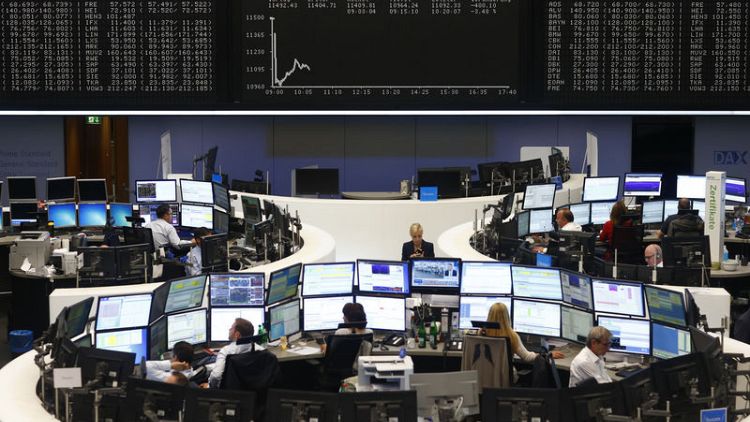By Josephine Mason
LONDON (Reuters) - Investors are piling into European equity futures at a record pace, preferring derivatives to cash markets, in a sign they are worried the market is hurtling towards a major rout amid concerns about a slowing global economy and the trade war.
Open interest -- a measure of a market's liquidity -- in the Eurostoxx futures index hit record highs on a monthly basis of 4.61 million lots on Monday, up from 4.48 million in May and almost 1 million lots higher than a year ago.
The total has fallen in recent days to 3.91 million contracts, which is still well above five-year averages. Open interest in May was a record and April was the third highest on record.
The jump reflects bets in either direction -- investors use a short futures position to hedge against a long cash bet or go long futures to get exposure to the rally in the benchmark index without taking a long-term cash position.
Futures have become more popular in recent years as funds have launched absolute return or multi-asset strategies that often seek to capture moves in headline indexes rather than exposure to individual stocks.
As a deeper pool of liquidity, it is easier for investors to buy and sell futures.
Open interest can fluctuate sharply each month, particularly towards the end of a quarter when investors either close out or roll over positions.
Activity in futures also typically rises during periods of market tumult. Turnover in the Eurostoxx 50 soared in December from November and during the global financial market rout when implied volatility shot up.
But recent months have seen a pronounced pick-up in open interest even though volatility has remained relatively stable -- a signal that investors are seeking to protect against a market crash.
The rise is all the more significant because volumes in cash equities in Europe have fallen amid tighter regulation, worries about Brexit, political upheaval in the euro zone and a broad economic slowdown.
In January-May, cash equity volumes across 15 European exchanges fell 16% from a year earlier, their slowest pace for those months since 2014, exchange data analysed by UBS shows.
For Edmund Shing, global head of equity and derivatives strategy at BNP Paribas, the surge in open interest shows uncertainty about the direction of stock markets after the unexpectedly strong and prolonged rally so far this year.
"Investors are still frozen in the markets headlights and the default is to do nothing," he said. "They don't want to get stuck in cash equities and are hedging via futures."
The pan European STOXX 600 is up more than 13% so far this year, putting it on track for its best year since 2013.
Graphic: EU and Wall Street markets - https://tmsnrt.rs/2FwgCek
UNPOPULAR RALLY
The data also underscores the idea among investors that this has been an unpopular rally, lacking the conviction that has propelled Wall Street higher for the past 10 years -- its longest bull-run in history.
Investors have pulled $137 billion (£108 billion) from global equities so far this year, more than half -- $76 billion -- from Europe.
For Stephane Barbier de la Serre, macro strategist at Makor Capital Markets in Geneva, it's another sign the market is nearing the end of its super-long cycle.
With caution pervading markets, investors prefer equity index futures rather than punting on individual cash stocks or benchmark cash indices because they are more liquid.
"People are still concerned about downside risk. They feel like they have to be in the market because if not, you can miss these types of rallies, but they are going with a very cautious approach," said UBS equity analyst Michael Werner.
"If you talk to investors and fund managers, people are happy things are up after an abysmal Q4, but they are still very concerned about the macro threats and trade war tariffs."
(Reporting by Josephine Mason; Editing by Catherine Evans)



